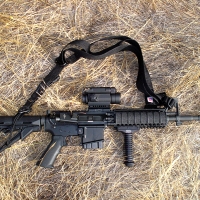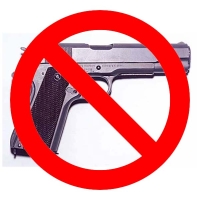- About Us
- Columns
- Letters
- Cartoons
- The Udder Limits
- Archives
- Ezy Reading Archive
- 2024 Cud Archives
- 2023 Cud Archives
- 2022 Cud Archives
- 2021 Cud Archives
- 2020 Cud Archives
- 2015-2019
- 2010-2014
- 2004-2009
 |
Why Getting Rid of Guns in the U.S. is Harder Than You Think |
In the U.S., sometimes we forget that the world doesn’t really get the fine details as to WHY there is such a fierce debate over gun control here. To outsiders, it must seem ludicrous that it’s even a problem. So today, as a gun owner, I’m going to boil down the basics and then make my case for gun control.
Part I:
The Second Amendment
The Constitution of the United States is the foundation of our rights. When the Founding Fathers drafted it, they spelled out the basics in its articles and established ways to change it. And they changed it immediately with the drafting and passing the first ten amendments, known as the Bill of Rights.
The First Amendment, arguably the most important, spells out five basic things: that the government can’t establish a religion, and that we have freedoms of religion, speech, the press, and peaceable assembly.
Then comes the Second Amendment, which says: “A well regulated Militia, being necessary to the security of a free State, the right of the people to keep and bear Arms, shall not be infringed.”
The U.S. has a balance between the federal government and the states; states must adhere to federal law in many cases, such as observing the Constitution, but can make their own laws otherwise. To place a check and balance against a standing army that might seek to overthrow a state, “well regulated Militia” referred to state militias.
But it conflates “well regulated Militia” with “the right of the people.” “The people” seems to refer to the populace as a whole, since we’re talking about militias here. But the Second Amendment has been interpreted to mean that anyone, whether an active militia member or not, can keep and bear arms. After all, if someone attacks—whether a foreign invader or, as the Founding Fathers were concerned with at the time, federal troops trying to disarm a state militia—the private citizens with their guns would be invaluable to defense.
This is a sensible balance, but the debate ultimately comes down to that last bit: “shall not be infringed.” If the right of the people to keep and bear arms shall not be infringed, doesn’t that mean that there can never be any law that interferes with that right?
That’s what the gun-rights advocates seem to believe, but the truth is that we limit our rights all the time. I wrote about this two years ago HERE. Let’s review some of the common-sense ways that we limit the First Amendment.
We have freedom of speech. But you can’t threaten, libel, or slander someone and call it free speech without legal—even criminal—consequences.
Freedom of speech includes any expression in any way. That means that pornography must be allowed to be legal, but that doesn’t mean that you can force someone to engage in pornography or produce kiddie porn and call it freedom of expression.
Freedom of religion means that you can practice any religion you like, or no religion at all, and the government can’t do anything about it. But you can’t force underage girls to marry you or abuse children just because your religion tells you that you can.
Freedom of the press places checks and balances on the government. But the press can’t make stuff up; they confirm the facts before they assert, and if they correct the record when they err.
Freedom of peaceable assembly lets us organize protests like those courageous teenagers did on March 24. But typically you need a permit to reserve a spot for your protest, ensure an orderly process, keep traffic moving, not disrupt businesses, and have ample law enforcement available. Surprise flash protests will you get in trouble.
So we DO limit our rights—even those enshrined in the First Amendment, arguably the most important amendment; it was first, after all, and features five key things. The right to keep and bear arms is the Second Amendment. Some might argue that it was important enough to have an amendment all to itself. I argue that if it were as important as those first five things, it would have been there. It wasn’t.
We already have some limitations on the Second Amendment. You can’t buy a handgun if you fail a background check. You can’t get a concealed-carry permit in many jurisdictions if you have a known history of mental illness. We don’t let minors buy guns. We don’t let someone intimidate another with a gun. And we don’t allow firing off guns just anywhere.
The gun-rights advocates will have you believe that we already limit gun rights enough, or too much. Many think we should abolish all gun-control laws. But the facts show that common-sense gun-control laws won’t infringe on the rights of responsible people to keep and bear arms, and WILL—regardless of popular claims to the contrary—reduce gun deaths.
Part II:
Undisputable Facts and Common-Sense Ideas
The Boston Globe recently published its powerful and informative “Seven Steps. 27,000 Lives” HERE. Massachusetts has some of the toughest gun laws in the country, and in 2016 it also had the lowest rate of gun deaths of any state at 3.5 per 100,000 people. Gun control works.
The Washington Post reported some stunning numbers as well. Amazingly, just 3 percent of Americans own half of all guns here. Just 22 percent own guns at all—meaning 78 percent don’t. Read that HERE.
And since we limit the First Amendment, why shouldn’t we limit the Second Amendment? Shouldn’t we at least treat the Second Amendment the way we treat others? The answer, we often hear, is that any such limitations will infringe upon the rights of those who own guns. So the best question to ask of anyone blindly fighting against common-sense gun control is this: How will common-sense gun control affect you? If they’re not violent criminals, mentally ill, or wanted somewhere, most will never see a difference. Here are some things that wouldn’t make a difference to anyone who isn’t mentally ill or a criminal:
Expanded background checks. This should include private sales and at gun shows. There’s no reason not to, unless you want criminals and the mentally ill to have guns.
Make it more difficult for mentally ill people to get them. The GOP recently rolled back an Obama-era rule, with support from some Democrats and the ACLU, that made it tougher for mentally ill people to get guns. See HERE for details.
Limit access to assault weapons. During the 1994-2004 period of the federal assault-weapons ban, deaths in gun massacres (six or more deaths per incident) dropped by 37 percent compared to the ten years prior to that. But when the ban ended, the next ten years saw nearly triple the number of massacres and more than triple the deaths in those massacres. Banning them worked; ending the ban was disastrous. Read more HERE. Now, I’m sure that firing assault weapons is fun, so we can allow them only to specially trained and licensed owners to be used under supervision at gun ranges. Based on the careless people I’ve seen shooting them off on YouTube videos, it’s clear that not just anyone ought to have them even if they aren’t violent criminals or mentally ill. Remember, many of the mass-shooting killers legally got their assault weapons, or got them from someone else who had gotten them legally.
Place limitations on what kinds of guns anyone can own. When the Founding Fathers drafted the Second Amendment, “arms” did not mean what it does today. I doubt they’d agree that citizens should own weapons of war. Do we allow average citizens to own rocket launchers? Land mines? How about futuristic weapons that we don’t yet have but one day will, such as particle beams, radiation guns, and laser blasters? I bet the Founding Fathers would have laughed at the concept of an AR-15 as pure fiction, too. Weapons of war have no place outside their intended venue, and common sense dictates that there must be a cutoff point in what we allow.
Limit high-capacity magazines for handguns. When Jared Lee Loughner opened fire in Arizona, he did so with a semi-automatic Glock pistol with a 33-round magazine. Had he used an assault rifle, he would have mowed down everyone. As it was, he killed six and shot seven others, including Rep. Gabrielle Giffords in the head. He was stopped because he had to reload. Imagine if he’d had just a ten-round magazine. Imagine if he’d had no gun at all.
Gun licensing and registry. We track a vehicle with a VIN s and know every owner it ever had, every accident that went through an insurance company, and every major service logged through a service such as Carfax. Do this with guns, and we’ll always know who owns it. Require registration every year, just like a car. If a gun goes missing, investigate, and bar the owner from any gun ownership until it’s found.
Require psychological evaluations. The gun lobby claims that all of these mass shootings happen because people are crazy and need help—even as the GOP works to undo health care for all. But I’ll agree with the gun lobby on this, so let’s institute psych evals. Something like the MMPI-2 (https://goo.gl/gzVHv3; check out the clinical scales for the sorts of things that it can reveal) would be an ideal way to identify the mentally unhinged. Want a gun? Take the test. Personally, I suspect that there are some seriously unhinged gun nuts out there who currently fly under the radar. I bet the gun lobby knows this, too, so they won’t like this idea.
Require responsible ownership. A police officer I know had a habit of leaving his duty belt with sidearm lying around the house. His wife couldn’t break him of it until the day she walked into the kitchen to find her toddler pointing the gun at her mother. This man trained at the Maine Criminal Justice Academy and was a hunter who handled weapons his entire life. If he can screw up that badly, why shouldn’t we demand mandatory trigger locks and gun safes? If there’s any doubt as to the need for this level of security, read the fantastic op-ed at HERE by an Army veteran who knows more than most of us about firearm responsibility.
Common-sense ideas? They far-right gun-rights folks won’t think so. Then what’s left to do?
Part III:
Why Not Repeal the Second Amendment?
None of those ideas worry me as a gun owner, because I'm neither a criminal nor mentally unstable. Background checks, psych evals, and social responsibility are sane things that I would never object to because they won’t prevent me from owning a firearm. So when you hear someone deflecting from the facts and screaming that the Second Amendment is under attack, know that there are three possible explanations for their behavior:
1. That person knows that such ideas are common-sense ideas but will never admit it. You can’t fix dishonesty.
2. That person is uninformed, but is either unable or unwilling to investigate the facts. You can’t fix apathy or stupidity.
3. That person knows that his/her gun ownership might be in jeopardy because of his/her legal/mental issues. You can fix this: You weed these people out of the gun-ownership pool.
But if the gun lobby opposes those kinds of ideas, what’s left? Do we repeal the Second Amendment? The gun lobby has been screaming for years about that—a rallying cry that frightens the masses, and it works. But repeal isn’t that easy.
Amending the Constitution is a straightforward process. Two-thirds of each house of Congress, or two-thirds of a constitutional convention called by Congress, can adopt an amendment. If successful, then three-fourths of the states (currently 38) would have to ratify it for it to become part of the Constitution.
I don’t think we’re in any immediate danger of two-thirds of Congress agreeing on this subject, never mind three-fourths of the states. But despite the gun lobby’s cries that the sky is falling, very few people are seriously advocating for it. One of them is retired U.S. Supreme Court Justice John Paul Stevens, who recently wrote an op-ed in the New York Times advocating for repeal of the Second Amendment.
“Concern that a national standing army might pose a threat to the security of the separate states led to the adoption of that amendment, which provides that ‘a well regulated militia, being necessary to the security of a free state, the right of the people to keep and bear arms, shall not be infringed,’” Stevens wrote. “Today that concern is a relic of the 18th century.”
He’s absolutely right. But even attempting to repeal the Second Amendment will almost certainly do more danger to the efforts to establish common-sense gun control, so I don’t agree with it—and it’s just not going to happen in the near future anyway. But you can bet that the gun-rights crowd will use that as evidence of a liberal conspiracy to take away their guns.
The irony is that the tactics of the gun lobby are what endanger the Second Amendment. Every time more innocent people are gunned down and the NRA fights against common-sense gun control and still nothing changes with our gun laws, more young people like those who organized the March 24 protests become emboldened to effect change. The longer this goes on, the more people die, the stronger their resolve becomes.
The U.S. has always moved forward. Old ideas die; new ideas bloom. Things that don't make good social sense ALWAYS go away. People wanted slaves; that changed. People wanted segregation; that changed. People wanted to require prayer in school; that changed. People wanted abortion to be illegal; that changed. People wanted to prevent gay marriage; that changed. Old socially conservative beliefs always go away eventually. Progressive ideas ultimately take hold.
One day, society will finally say, “Enough.” Today, just 22 percent of Americans own guns, and just 3 percent own half of all guns here. One day the numbers will be much lower, and the number of non-gun-owners who still feel some blind dedication to never limiting the Second Amendment will be too few. One day, Americans fed up with gun violence will place ever harsher limitations on the Second Amendment—or repeal it altogether.
Gun-rights proponents need to embrace change when it comes to gun laws. They need to be part of the solution, and not blindly following an angry, fearful group that has them all believing that gun laws are evil—because those changes are coming, whether they like it or not.
Part IV:
Guns Will Remain a Part of American Culture
Guns in America aren’t going away anytime soon. And while they’re here, there will be gun deaths. Even with common-sense gun control, there will always be that guy who was legally allowed to own a weapon who snaps and shoots up his wife, a dance club, a concert, a mall, or a school. Too many people are just horrible people, and we have to accept that.
Common-sense gun laws will reduce the people who own guns, the number of available guns, and ultimately the number of gun deaths. If someone can’t get an assault weapon, he can’t fire hundreds of rounds at defenseless people, so he won’t kill as many of them. If he has no access to any guns, he wouldn’t shoot anyone. If he goes on a school rampage with a big knife, I bet he doesn’t hurt or kill as many people as he would with an AR-15. Can the far-right gun folks really keep straight faces and argue with any of that? Only an idiot wouldn’t understand this simple math.
And, as far as I’m concerned, “idiot” should be added to the list of people who shouldn’t have access to guns. Violent criminals? Check. Mentally ill people? Check. Idiots? Check! I’m all for requiring IQ tests to establish someone’s basic level of intelligence, and if you’re not all that smart, why should the rest of us want you to have guns? Come on—stupidity has to be at least as much of a deciding factor as violent behavior or insanity.
That, I suspect, would limit a large chunk of the minority that opposes gun control, because many of the angry people who scream at me online seem woefully inadequate in the smarts department. But, boy, do they ever think they’re a band of geniuses. And the last thing we need is a horde of idiots with guns and delusions of grandeur.
The Second Amendment is enshrined in our Bill of Rights, and courts have interpreted that amendment to mean that anyone can own guns. Changing that is not going to happen in the near future. The only hope is common-sense gun-control legislation. And while repeal isn’t imminent, common-sense gun-control legislation probably is. And if the gun lobby fights those changes, then perhaps a new constitutional amendment is in order—one that doesn’t repeal the Second Amendment but spells out new and necessary checks and balances on it.
America is inherently a liberal nation; throughout history, conservative ideas fade away, because the world is ultimately a progressive place. As older Americans with burned-in beliefs that someone is coming to take their guns die off, and young people like the courageous protesters that we have seen come of age and begin to vote, change will happen.
The gun lobby needs to work together with them on common-sense gun-control legislation or find itself looking down the barrel of a metaphorical gun: the one that will blow a giant hole right through the Second Amendment—one way or another.
Rights are a responsibility, but there are far too many irresponsible people out there. It’s time to take charge of the Second Amendment and make it serve America instead of America serving it.
David M. Fitzpatrick is a fiction writer in Maine, USA. His many short stories have appeared in print magazines and anthologies around the world. He writes for a newspaper, writes fiction, edits anthologies, and teaches creative writing. Visit him at www.fitz42.net/writer to learn more.
